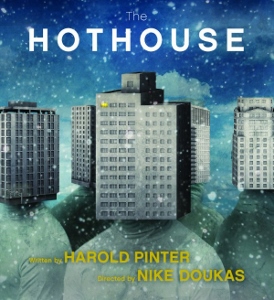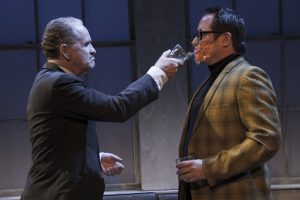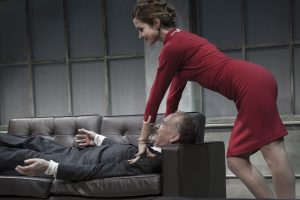A TRAGI-COMEDY OF VIOLENCE
Harold Pinter’s The Hothouse is exactly the kind of play I hope to see at the Antaeus Theatre Company. It is a classic to some but not to others, and there’s a lot of leeway in the text for bold choices, its themes are relevant — some might say eerily so — to the way we live now, and this production is excellent.
We are in a rest home, or perhaps a convalescent home, a sanitorium, or, if you prefer, a post-War British hell. On an unseasonably balmy Christmas Eve nothing stops for anything as human as a holiday, nor, does it seem any of the staff have anywhere else to be.
The first fifteen minutes or so is taken up with a baffling misunderstanding: One of the patients, identified as 6459, has given birth, while another, 6457, has died. The birth is a first at this establishment. We sense there may have been other deaths. Such is the sinister tone always lurking beneath the lines and in the sound design.
Mr. Roote is the imperious bureaucrat in charge, having worked his way to the top of the food chain. He wrestles with concocting a plan of non-action about the two patient mishaps, by turns officious, threatening, childlike, and vague. His direct subordinate is the razor-sharp, deceptively pleasant Mr. Gibbs — a perfect sycophant who undermines with every helpful, sensible gesture of support.
Other staff include the devilish, antiseptically sensual Miss Cutts, an enthusiastic hand at patient treatments and the mistress of both men. She convinces each that his affection is all she desires, indeed all she thinks about. The aptly named Mr. Lush almost always has a drink or a bottle in-hand, but is never so drunk that he stops trying to weasel his way to favor with Roote. The also aptly named Mr. Lamb is fed to the wolves, much to the delight of Gibbs and Cutts, and bureaucratic efficiency and murderous psychopathy become indistinguishable.
Harold Pinter wrote The Hothouse in 1958, between the commercial failure of The Birthday Party and his first big hit, The Caretaker. He lost confidence in The Hothouse, though, and it sat in a drawer until he came across it in 1979. He read it again, liked it, made some changes, and premiered the play in 1980. It quickly became a fixture in the Pinter canon.
Words are everything for Pinter, and here he uses music hall patterns of speech to give comic buoyancy to what is essentially a study of fascism and amorality. He is said to have once remarked that The Caretaker was funny only up to a point, and it was because of that point that he wrote it. The Hothouse is much the same. Belly laughs soon yield to darker forces. Roote’s own corruption and incompetence grind him to dust, and, in the end, the play takes a decidedly moralistic view of our inhumanity.
As Roote and Gibbs, Josh Clark and Leo Marks are magnificent. They have the accent just right — what the BBC and the Royal Academy of Dramatic Art used to call “Received Pronunciation” — a manner of speech that belonged specifically nowhere in Britain, and so came to represent everyone. Not one word or gesture is wasted with either actor. Of the two, Marks is the more menacing from the start. Whether this is an acting or directing choice, it might be more effective for the roles to start the reverse way and then switch, so that Roote is more tyrannical and powerful before Gibbs shows his strength. This also might have given the second act more ballast. For a brief stretch, the gamesmanship started to feel a touch tedious, before the momentum swept us back into the flow.
Steve Hofvendahl is an appropriately earnest patsy as Lamb, playing the man as someone who often brushes up against the truth, but sidles away before it can stick. His simplicity is not simple-minded, though, and his lack of understanding is layered and interesting. I am less taken with Melanie Lora’s Cutts and Adrian LaTourelle’s Lush. Both struggle to find consistency with the accents, and both performances can feel arch at times — as if they are playing the text without also utilizing the subtext. (Lora does have a wonderful sequence, though, when she slithers around a makeshift settee, amusing herself with her own hedonism.)
Director Nike Doukas keeps things moving at an admirable pace. The staging is always effective, as is Se Hyun Oh’s scenic design, Ginevra Lombardo’s lighting design, and Jeff Gardner’s sound design. Yet I wish Doukas had taken Pinter’s acidity and anger a step further in some places, more in line with the tone that I’m given to understand Pinter intended. There’s a moment when Roote luridly reveals his first-hand knowledge of the patient who has given birth, then, when asked what is to be done about the infant, he snaps, “Get rid of it.” Here, the line gets a laugh. I suspect it might be more effective as a punch in the gut.
photos by Geoffrey Wade Photography
The Hothouse
Antaeus Theatre Company
(the show is double-cast; “Pelicans” cast reviewed)
Gindler Performing Arts Center, 110 East Broadway in Glendale
Thurs and Fri at 8; Sat at 2 & 8; Sun at 2
ends on March 11, 2018
for tickets, call 818.506.1983 or visit Antaeus





